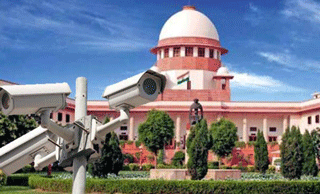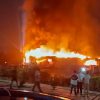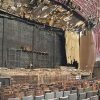Goa is abuzz with excitement as vintage bike and car owners, users, collectors and fans are decking […]

CCTV & AUDIO RECORDING MANDATORY IN COURTS!
In the News, May 22-May 28,2021 May 21, 2021SECURITY: In the interest if security the Supreme Court has directed all courts to install CCTVs. This is because there have been shoot-outs within court premises between groups of notorious criminals
By Advocate Vinayak D Porob
The Supreme Court has made it mandatory to install Close Circuit Television (CCTV) and audio recording of all the proceedings in court as in the case of Parliament and the Legislative Assembly
JUDIARY plays a very crucial role for several reasons not only in India but in the entire world as without efficient judiciary there would be chaos in any country. The independence of judiciary and the judicial officers’ authority to exercise its powers freely within the purview of law is mandatory to ensure justice to establish an efficient judicial system in any country. The role of advocates, who are officers of the court along-with the judicial officers is also very vital, as no court can effectually function without honest and competent members of the bar. Their responsibility is to maintain the standard of the judiciary which rests on the bar as well as the bench.
To maintain high standards in the justice delivery system of which the judiciary and the courts are major pillars, certain steps are mandatorily required to be adopted, so as to provide sufficient security to the advocates and judicial officers while performing their duties in open courts. The Supreme Court of India realizing the need passed a landmark judgement in case of Pradyuman Bisht v/s Union of India, wherein direction was issued to fix CCTV cameras along-with audio recording in all courts including subordinate courts and Tribunals.
To be precise all cases are generally heard in open courts wherein the public is permitted admission. As such under such circumstances reservation being expressed with respect to violating privacy of judicial officers if CCTV cameras are fixed, appears to be incredulous as any trial held subject to public scrutiny and gaze, acts as a check against judicial caprice or vagaries. CCTV and audio installations serve as a potent mode for creating confidence and trust of the public in the impartiality and fairness of the judiciary.
IN CAMERA
THE court rightly vests with discretion to hear certain cases in camera on sufficient grounds and hence public not having access to court proceedings as a general rule, can be catastrophic, as secrecy creates sinister suspicion. In case of any dispute between fair administration of justice on one hand and public trial on the other hand than fair administration of justice should prevail always.
In trial courts and especially regarding the security provided to the judicial officers, it is so lax and fragile that it is very difficult for a judicial officer, to resist and protect his or her person, if an attempt is made while discharging judicial functions in open courts. Hence, installation of CCTV camera installations will to a larger extent be a major step towards security of judicial officers presiding in open court rooms.
Similarly, for the security of the advocates while performing their duties, such as examination in cross and/or arguments or even upon being successful in a case after judgement is pronounced, there is always a looming risk either from the opposite party for lacking in grace in accepting court’s order, and/or from the witness under cross examination. This kind of situations can be minimized by installing CCTV cameras.
The judicial officers are legally well protected while discharging their judicial functions by virtue of Section 3 (1) of The Judges (Protection) Act, 1985 as no court can entertain or continue any civil or criminal proceedings against a judge for any act, thing or word committed, done or spoken by him when or in the course of, acting or purporting to act in the discharge of his official or judicial duty or function.
Similarly, in accordance with Section 77 of the Indian Penal Code, nothing is an offence which is done by a judge, when acting judicially in the exercise of any power which is or which in good faith he believes to be, given to him by law. The Contempt of Courts Act, 1971 is also a shield for the judicial officers while exercising their judicial functions, as any person misbehaving in court or undermining the powers of the court by committing civil or criminal contempt, can be rightly compelled to surrender to the might of the court. The protection granted to judicial officers is extremely crucial as every litigant would prosecute a judge in case of an adverse order which would in turn be calamitous and the judicial system would collapse, as no judicial officer has the privilege to play a draw while exercising judicial functions.
FLIP SIDE
HOWEVER, to this there is a flip side which cannot be neglected. Especially as it is concerning the safety and livelihood of advocates, who are officers of the court, and who are not guaranteed with any protection while performing their duties as advocates in court proceedings. In the event of an occurrence of an untoward happening, such as the judicial officer/judge perhaps insulting, humiliating and ridiculing the advocate by using words which are uncalled for, the advocate is helplessly supposed to tolerate without retaliation, as his instinctive and retaliative conduct can probably be a contempt of court. It can lead to severe repercussions including criminal proceedings and suspension and/ or cancellation of Sanad issued by the Bar Council which is the license to practice in law.
The judge while presiding in his court is a master of the court and it is not surprising that the staff of the court is always apprehensive in giving his/her testimony against the presiding judge, who is supposed to be their boss. Likewise for other intrinsic reasons and benefits and/or to maintain goodwill with the judicial officers, there are possibilities of other advocates witnessing the instance, also conveniently refusing to testify against the judicial officer. Proceedings in district and subordinate courts if captured on CCTV cameras by video and audio in the high courts of all the states, would be duly assisted while exercising their constitutional power of maintaining control over the district and subordinate courts envisaged under Article 235 of the Constitution of Indian.
IN CONCLUSION
HOWEVER, in order to prevent abuse of CCTV footage it is mandatory that the CCTV footage of the court proceedings be kept beyond the purview of the Right to Information Act. Rightly as such provisions of the Right to Information Act were not made applicable to CCTV footages of court proceedings by the Supreme Court in the Pradyuman Bisht Judgement.
(The writer is a practicing criminal lawyer of Mapusa.)















